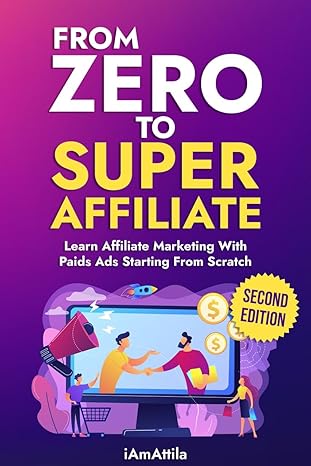What is Affiliate Marketing?
To understand and be able to connect the dots and understand how to use Shopify for affiliate marketing, you must first understand the basics. So, let’s start from the beginning.
Affiliate marketing is a widely used marketing strategy that brands don’t shy from when wanting to increase the awareness of their brand, increase customer engagement and grow their sales. Affiliate marketing rose to fame and saw an increase in implementation since the early 2000s when businesses started turning to digital marketing in an attempt to reach their target audience.
And the results support the facts as the USA saw an increase in affiliate spending from $2.5 billion in 2012 to a tremendous $8.2 billion in 2022. The core of this marketing strategy is a simple partnership between brands and affiliates (publications, influencers, etc…) which results in an award-based system where affiliates promote the brand, their products, and services to their audience in exchange for a commission earned for every sale made.
The ways that affiliates promote the goods are various! Spanning from blog posts to videos and recently through social media posts where they attempt to represent the goods, all of their benefits and uniqueness all accompanied by their affiliate link which takes their audience to the place where they can purchase the goods.
The bond between Affiliate marketing and Shopify?
The main reason behind the growth in the popularity of affiliate marketing is that it is a low-risk and low-budget marketing strategy which is proven to work in amassing more website traffic, increasing brand awareness, and shooting up revenue. It truly is a win-win situation for e-commerce brands based on Shopify. This is because affiliates promote goods that they really enjoy and would use in their day-to-day life and in return they earn a passive income.
Additionally, by partnering with various affiliates from different branches, brands on Shopify can increase their audience in different niches and platforms. Affiliate marketing plays an important role in establishing trust among online consumers. A study has shown that 77% of consumers make their decision about a purchase based on a review, and that’s where affiliate marketing kicks in and does its magic. Therefore, by promoting a product, affiliates contribute to the increase of trust and loyalty among buyers.
Setting up a Succesful Affiliate Program on Shopify
There are two ways how you can approach setting up an affiliate program:
- Selling affiliate products on your Shopify store
- Setting up an affiliate program on Shopify
First, let’s cover option number 1.
Assuming you already own your Shopify store and have an established customer base also products that you are selling on your store, you would need to choose to promote products that complement your existing store. Otherwise, your customers won’t be interested in the marketed products and you won’t see any sales.
It will greatly benefit you and your business to join an affiliate marketing program that works well with your Shopify store strategy.
One of the best programs for Shopify is definitely Amazon Associates. With this program, you can earn up to 10% from the purchases that people make through your website and you get a really broad selection of products.
One of the sites you should be scouting if you’re interested in a larger-scale affiliate partnership is Affiliate or DFO Global.
Back to Amazon Associates. After applying and getting approved, you will get custom links for the products that you choose to market. After that, you just implement them into your store as you would your other products. The custom links are there to track oncoming traffic which is sent through them and all you need to do is to link them to corresponding products.
After you’ve selected products you wish to promote, accompanied them by their respectful links, and published them on your store, the next thing is optimization!
You will need to take care of:
- Outstanding product descriptions – you need to convince shoppers that you believe in the product you advertise and bring its benefits closer to them. Also, let them know that beneath it all you are just trying to make a profit.
- Improve store loading time – In the attempt to describe the product as best as you can, that would mean publishing a lot of images. Your job is to compress them without losing quality so they would load faster.
- Follow SEO practices – Your store should be one of the first to pop up on search engines. To get there, you have to ensure fast loading times, have meta tags and JSON-LD in place, fix broken links, and more.
And now, option 2.
This method is the most popular among Shopify store owners. It brings more people to the store as well as increases sales of existing products.
First of all, you need to choose which product you want to promote and offer to affiliates. The best bet is to offer products with a higher average order value. Because affiliates want to make their effort count, getting 5% commission on a $10 product and on a $100 product isn’t the same. Also if you go on the route of pay-per-sale then you might want to opt out of low-value products from your offer since that simply won’t be profitable on your end.
There is a set of questions you should ask yourself before starting your affiliate program and starting looking for affiliates.
- Your target audience: What kind of customers do you wish to attract through the affiliate marketing program?
- Your ideal affiliate partner: what is the ideal affiliate partner you would like to work with?
- Your affiliate marketing model: What kind of partnership would the affiliates want? Percentage of revenue or par-per-sale?
- Store growth expectations: how much growth do you want or expect out of the partnership?
- Revenue expectations: what amount of sales do you want to see through the affiliate marketing program to make it profitable?
- Short and long-term objectives: what do you need to do to successfully kick off an affiliate program for your Shopify store? What steps will you need to take to successfully manage it along the way?
- Marketing channels: how will I attract the right type of affiliates?
The next step would be deciding upon the fees and commissions you are willing to pay your affiliates. The main point here is to decide upon a fixed value or percentage. You will need to examine your profit margins and see what will be more profitable for you.
In general, most Shopify stores settle for a 10% commission which is the go-to for most industries.
Recruiting affiliates is a two-sided process. On one side, you want to offer a good commission to your affiliates for the sales they drive to you, but also try and keep a good profit margin for yourself.
A recommendation for choosing affiliates is stalking their social media platforms. If you like their content, they have a large following with a loyal fan base and an added bonus is if they promoted products before where you can see how they do it. If everything seems okay, then it’s time to contact them and see if you can find common ground.
Also, don’t forget to give your affiliates as much info and tips as you can, after all, they are influencers, not skillful marketers.
Be sure to track the performance of your affiliates, there is always a chance that some of them won’t do a good job and you should review your partnership. Just by signing with an affiliate isn’t getting the job done, you should analyze their performance, and offer them help if they aren’t doing so well. If all else fails, sometimes you just need to quit the partnership.
Why you Should do Affiliate Marketing on Shopify
If you want a breakdown of reasons to do affiliate marketing on Shopify, here is a short list:
- It helps your store grow faster – The more affiliates you have, the more people they will attract, and with a good conversion rate, your revenue is sure to rise.
- It brings a lot of benefits if you find loyal customers – A returning customer is the best type, also if they come to your store next time, you don’t pay any commission.
- It’s risk-free – There are no initial investments and the commitment is low, but the benefits can be huge for your business.
For more information about affiliate marketing make sure to visit my blog IAmAttila or join my premium forum IAmAffiliate for exclusive tips, guides, and much more.







